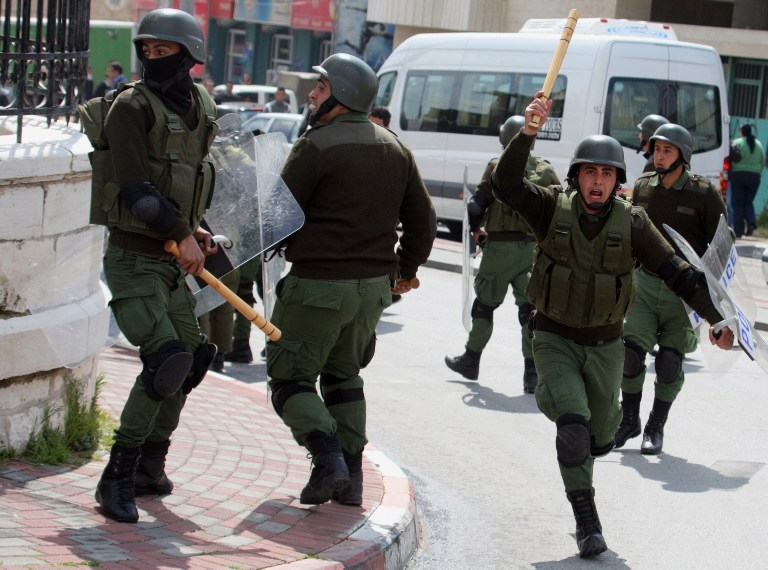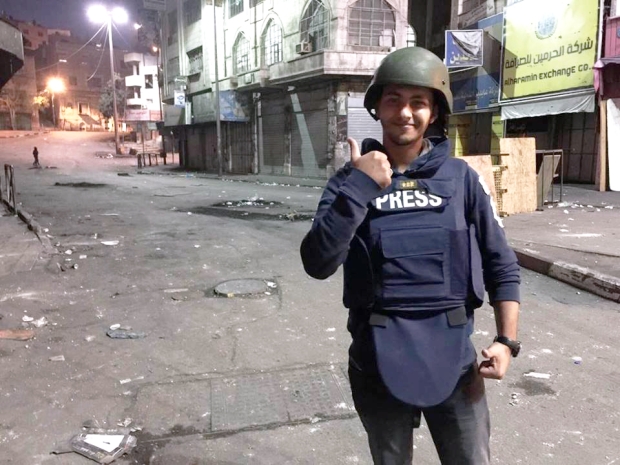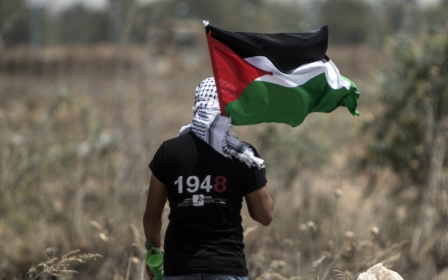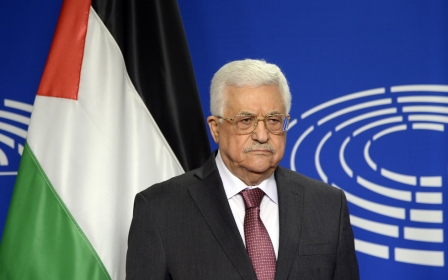Journalist forced into exile by Palestinian Authority ‘death threats’

BETHLEHEM, Occupied West Bank - A young Palestinian journalist and contributor to Middle East Eye says that he has been forced into exile because of death threats from the Palestinian Authority after he exposed police brutality in the occupied West Bank.
Abed al-Qaisi, 24, is from the Beit Jibrin refugee camp in Bethlehem and his work has regularly appeared in Middle East Eye, as well as in Al Jazeera English, Vice, and elsewhere.
On 15 May, he left the West Bank to travel to Europe for a three-week leadership programme. But as he tried to enter Jordan at the Allenby Bridge crossing, Israeli authorities held him for seven hours, during which time they repeatedly interrogated him about his planned trip.
After finally being given permission to travel, Qaisi was told that he should return for further interrogation in Bethlehem two days later. Instead, he decided to travel to Europe where he completed his leadership programme and has since remained because he fears that he will be imprisoned or worse if he returns home.
Qaisi’s interrogation by Israeli authorities was the culmination of what he claimed has been months of intimidation and threats that have mostly come from his own government – the Ramallah-based Palestinian Authority (PA).
Qaisi said that he has been targeted because of a video he published with MEE last September which showed PA security forces beating Palestinians in Bethlehem during a protest against Israeli settler attacks on the Aqsa mosque compound in Jerusalem.
The video showed at least 10 security forces surrounding two teenage protesters who lay on the ground as officers kicked and beat them with batons.
The MEE footage was viewed over 60,000 times and it caused outrage as it spread across Arabic and English media outlets in the region.“It was the first time Palestinians could see on camera the PA beating their own people,” Qaisi said.
Public anger at the beatings led to the PA forcing four senior officers into early retirement, including Deputy Commander of the Bethlehem Area Issam Nabhan and Deputy Director of Operations Shaher al-Qaisi.
Six lower ranking officers were sentenced to three months in prison and barred from promotion for one year.
PA Prime Minister Rami Hamdallah said at the time that the security forces’ misconduct did “not reflect the policy of the Palestinian government or the Palestinian security forces”.
However, soon after, Qaisi said, the security forces approached him about the abuse he had captured on camera. Initially, they wanted him to work for the Palestinian intelligence agency, but Qaisi refused.
“After 10 days they started interrogating me,” he said. “They told me I had three options: be killed in a car accident, be found with guns in my home, or be accused of being an Israeli spy.”
“Everyday I was – and am – worried they will come for me,” he said.
This fear has been compounded since he left for Europe. After leaving his Bethlehem home, Qaisi was contacted on Facebook by PA intelligence officers who said they want to interrogate him.
MEE has seen a copy of a Facebook conversation from 27 May in which a man purporting to be a Palestinian intelligence officer who has detailed knowledge of Qaisi's history ongoing issues iwth the security forces told Qaisi he has been “summoned for interrogation”.
Qaisi’s lawyer has told him that if he returns to the West Bank, he is likely to be arrested, put on trial in a military court, and imprisoned for a minimum of three years.
However, his lawyer added that he could face up to a decade behind bars if the PA accuses him, as they have threatened, of being a spy for Israel.
For this reason, Qaisi has decided to stay in Europe and study there. He asked that MEE not reveal his specific location because he is fearful of PA agents coming after him – even in Europe.
Another reason for keeping his location a secret, Qaisi said, is because his family has suffered intimidation in Bethlehem. He didn’t want to reveal the nature of the intimidation because he said it could endanger them further if the details were published.
Qaisi said his life has been “ruined” since the publication of the MEE video last September, and that while the footage was “a big deal for Palestine” he has regrets about it being published.
“I don’t feel good that I shared this video because I put my life in danger,” he said.
Qaisi said he understands the peril he is in, and the potential suffering that a lengthy prison sentence would bring, because of his own personal experience.
As a 16-year-old, Qaisi was arrested by the PA for a month in October 2008 for his involvement in protests against the Israeli occupation of the Palestinian Territories.
Ten days after being released by the PA, he was arrested again, this time by Israeli authorities, who imprisoned him for almost two and a half years for throwing stones at soldiers during protests in the West Bank.
He was released as a 19-year-old on 28 April 2011. It was during his time in prison that Qaisi decided that he wanted to become a journalist.
“I didn’t sleep very much in prison,” he said. “I thought a lot about what we Palestinians need to do to be free – and I decided that raising our voice in the international media is one of the most important things we can do.”
While his career has so far focused on Palestinian issues, Qaisi has also travelled throughout the region and reported from Iraq, Syria, Turkey, Ukraine, and Jordan.
“There is no way journalists can operate freely in Palestine right now,” he said.
“The PA wants journalists to write stories about how difficult life is for Palestinians but they want you to leave them alone – and also not to criticise Israel too much.”
A spokesperson for the PA intelligence agency told MEE they were aware of Qaisi’s case and they denied having threatened him.
“We don’t need anything from him,” Adnan Aldamiri said. “The people who should have been punished [for the video] were punished – the soldiers and senior officers.
“We are not chasing him (Qaisi) and we have not threatened him. I invite him to return [to the West Bank] and I guarantee nothing will happen to him.”
But Qaisi decried what he described as corruption in Palestinian politics, accusing the PA of acting like a “mafia”.
“The PA is run like a family business not a government,” he said. “It’s also only an authority – not a government – and it acts like a security company for Israel.
“They do not have the people’s interests at heart.”
It is for these reasons that for the foreseeable future Qaisi sees his future as being away from his home in Bethlehem.
“I will return to Palestine when the government changes – when Abu Mazen leaves,” he said, referring to the 81-year-old PA President Mahmoud Abbas.
“I can’t live there because I always feel under threat. I can’t live a normal life in Palestine anymore.”
Middle East Eye propose une couverture et une analyse indépendantes et incomparables du Moyen-Orient, de l’Afrique du Nord et d’autres régions du monde. Pour en savoir plus sur la reprise de ce contenu et les frais qui s’appliquent, veuillez remplir ce formulaire [en anglais]. Pour en savoir plus sur MEE, cliquez ici [en anglais].






